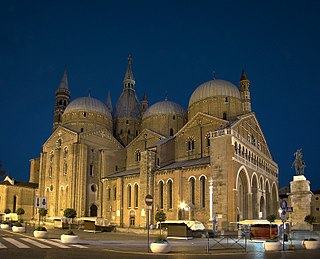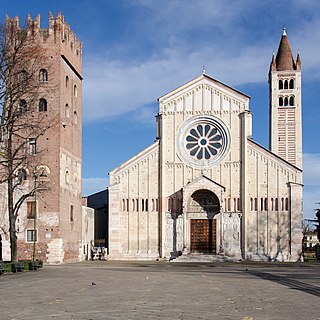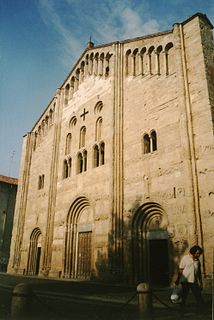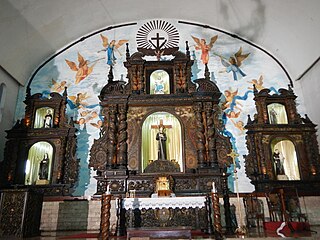
San Pedro (St Peter) is a minor basilica in Córdoba, Spain. The church is located in the square of the barrio (quarter) bearing its name.

San Pedro (St Peter) is a minor basilica in Córdoba, Spain. The church is located in the square of the barrio (quarter) bearing its name.
The building is believed to be located over a previous edifice housing the remains of the Córdoban martyrs Januarius, Martial and Faustus, dating to the 4th century AD. After the conquest of the city by king Ferdinand III of Castile (1236), a church dedicated to St. Paul was built here in his program of construction to give a Christian appeal to the previously Muslim city. Construction began in the late 13th century and was completed in the early 14th century.
The edifice's current appearance date mostly to later restorations. Part of the bell tower and two of the medieval gates have survived, a new one having been added by architect Hernán Ruiz II in 1542. In 2006, the church was elevated to the status of minor basilica by Pope Benedict XVI. It is a Bien de Interés Cultural monument.
| Wikimedia Commons has media related to Basílica of San Pedro, Córdoba, Spain . |

In Ancient Roman architecture, a basilica is a large public building with multiple functions, typically built alongside the town's forum. The basilica was in the Latin West equivalent to a stoa in the Greek East. The building gave its name to the architectural form of the basilica.

Assisi is a town and comune of Italy in the Province of Perugia in the Umbria region, on the western flank of Monte Subasio.

The Cathedral-Basilica of Our Lady of the Pillar is a Roman Catholic church in the city of Zaragoza, Aragon (Spain). The Basilica venerates Blessed Virgin Mary, under her title Our Lady of the Pillar praised as "Mother of the Hispanic Peoples" by Pope John Paul II. It is reputed to be the first church dedicated to Mary in history.

The Metropolitan Cathedral Basilica of the Holy Saviour or Cathedral of San Salvador is a Roman Catholic church and minor basilica in the centre of Oviedo, in the Asturias region of northern Spain.

San Sebastiano fuori le mura, or San Sebastiano ad Catacumbas, is a basilica in Rome, central Italy. Up to the Great Jubilee of 2000, San Sebastiano was one of the Seven Pilgrim Churches of Rome, and many pilgrims still favor the traditional list.

The Basilica of Sant'Ambrogio is a church in the centre of Milan, northern Italy.

The Pontifical Basilica of Saint Anthony of Padua is a Roman Catholic church and minor basilica in Padua, Veneto, Northern Italy, dedicated to St. Anthony. Although the Basilica is visited as a place of pilgrimage by people from all over the world, it is not the titular cathedral of the city, a title belonging to the Cathedral-Basilica of St. Mary of Padua. The basilica is known locally as "il Santo". It is one of the eight international shrines recognized by the Holy See.

The Cathedral of St. Mary of La Seu Vella is the former cathedral church of the Roman Catholic Diocese of Lleida, in Lleida, Catalonia, Spain, located on top of Lleida hill.

The Basilica di San Zeno is a minor basilica of Verona, Northern Italy constructed between 967-1398 AD. Its fame rests partly on its Romanesque architecture and partly upon the tradition that its crypt was the place of the marriage of Shakespeare's Romeo and Juliet. It stands adjacent to a Benedictine abbey, both dedicated to St Zeno of Verona.

The Basilica of Our Lady of Zapopan and the abbey of Our Lady of Expectation of Zapopan are a 17th-century Franciscan sanctuary built in downtown Zapopan, in the state of Jalisco, México.

The Basilica of San Michele Maggiore is a church of Pavia, one of the most striking example of Lombard-Romanesque style. It dates from the 11th and 12th centuries.

San Piero a Grado is a church in Pisa, Tuscany, Italy, in the eponymous frazione 7 kilometres (4.3 mi) west of the city center. The church is located where once was a now disappeared port of the Pisan Republic, where, according to the legend, St. Peter landed in Italy from Antiochia in 44 AD.

The Basilica Minore de San Pedro Bautista(Saint Peter Baptist Basilica), also known as the San Francisco del Monte Church is a parish church in the San Francisco del Monte district of Quezon City, in the Philippines. It is one of the oldest churches in the country having founded in 1590. The church is dedicated to its founder Fr. Pedro Bautista, a Spanish missionary from Ávila, Spain, one of the 26 Christians martyred in Japan in 1597.

The Basilica of San Simplicio is a Basilica in Olbia, northern Sardinia, Italy.

The church of San Isidro el Real, also known as the colegiata or collegiate church of San Isidore, is a Baroque building in the centre of Madrid, Spain. It is named after and holds the remains of the patron saint of Madrid, Isidore the Laborer, and his wife Santa María de la Cabeza. It has held the status of a Basilica church for centuries.

The Minor Basilica of Saint Michael the Archangel , commonly known as the Tayabas Basilica, is a Roman Catholic basilica located in Tayabas, Quezon, Philippines under the Roman Catholic Diocese of Lucena. Its titular is Saint Michael the Archangel, whose feast is celebrated annually on September 29.

The Collegiate Basilica of Santa Maria, also known as La Seu, is a Romanesque-Gothic church in Manresa, Catalonia, north of Spain.

The Basílica Menor del Santo Niño de Cebú, commonly known as Santo Niño Basilica, is a minor basilica in Cebu City in the Philippines that was founded in the 1565 by Fray Andrés de Urdaneta, O.S.A. and Fray Diego de Herrera, O.S.A.. The oldest Roman Catholic church in the country, it is built on the spot where the image of the Santo Niño de Cebú was found during the expedition of Miguel López de Legazpi. The icon, a statuette of the Child Jesus, is the same one presented by Ferdinand Magellan to the chief consort of Rajah Humabon upon the royal couple's christening on April 14, 1521. It was found by a soldier named Juan de Camuz forty years later, preserved in a wooden box, after Legazpi had razed a local village. When Pope Paul VI made the church a basilica in 1965, he declared it to be "the symbol of the birth and growth of Christianity in the Philippines."

Lombard architecture refers to the architecture of the Kingdom of the Lombards, which lasted from 568 to 774 and which was commissioned by Lombard kings and dukes.

The Palacio de la Merced is a historical building in Córdoba, Andalusia, southern Spain. Once home to the convent of La Merced Calzada, it is now home to the Provincial Government of Córdoba, a sovra-municipal services institution of the province of Córdoba.